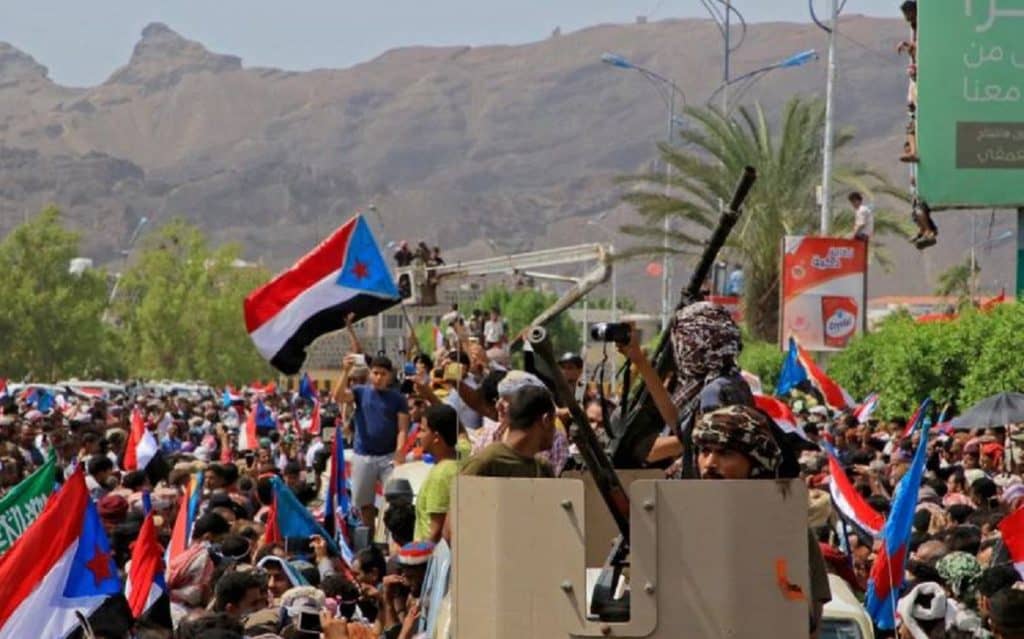By Denis Korkodinov
The capture of the city of Aden by the forces of the Southern Transitional Council creates the basis for the proclamation of the independence of the Yemeni South. As a result of this, the conflict in Yemen will develop along an ascending path. At the same time, the Ansar Allah movement (Hussites), the Islamic State, and Al Qaeda will be able to use this situation to strengthen their positions in the central and northern regions of the country.
The international coalition of Arab countries is unlikely to normalize the situation in Yemen, which in fact has again been divided into many political and administrative entities.
The conflict in the territory of the Yemeni South began in 2015, when the first clashes took place between supporters of Abd Rabbo Mansour Hadi and local separatists. However, the military failures of the Hadists led to the fact that Aden was almost completely controlled by the armed group of Idarus al-Zubaidi, who led the Southern Transitional Council.
With the support provided by Abu Dhabi, the southerners of Yemen were able to strengthen their influence in Aden, which allowed them to start a project to revive their own independence. To achieve such an ambitious goal, the Southern Transitional Council seeks to increase pressure on the Hussites and, through provocations, induce Saudi Arabia to strike at the territory of the North, which, however, may be the basis for expressing dissatisfaction on the part of southern groups loyal to the Ansar Allah movement.
The main drawback of international attention to the Yemen conflict is that, as a rule, it is focused on the confrontation between Hussites and Hadists, while other aspects of the military-political development of Yemen remain in the shadows.
This circumstance allows the Southern Transitional Council to unhinderedly strengthen its power on the ground and, ultimately, cherish the dream of independence more and more practically under the nose of the international community, which prefers not to notice the problem. At the same time, the relative fragmentation of the South, where the positions of pro-Husit groups, Al-Qaida and the Islamic State are still strong enough, does not allow us to conclude that the independence of southern Yemen is a matter of immediate prospects.
In the end, on the way to independence, the Southern Transitional Council needs to overcome disagreements with the local opposition or try to physically destroy it, which takes a lot of time. The main difficulty for the leader of the southerners, Idarus al-Zubayidi, is overcoming the resistance of local tribes, especially in the governorates of Al-Mahr and Hadramaut.
The split of Yemen will further strengthen the confrontation between the UAE and Saudi Arabia. Riyadh still proceeds from the opinion that modern Yemen is a single state where the central power belongs to Abd Rabbo Mansour Hadi. Abu Dhabi, in turn, is focusing on further fragmentation of the country. These irreconcilable differences between the countries of the Arab coalition impede de-escalation of the conflict and create the basis for further deepening of the crisis. Be that as it may, southerners have successfully enjoyed the confrontation between Riyadh and Abu Dhabi.
Thus, the Southern Transitional Council is trying to provoke the emirate to attack the positions of the Saudis in the expectation that these positions will subsequently be occupied by the forces of the South. In addition, the attacks of Saudi Arabia on the territory of the North also correspond to the interests of the southerners, who thus seek to weaken the positions of the Hussites and their political groups affiliated with them.
(The views expressed in this article belong only to the author and do not necessarily reflect the views of World Geostrategic Insights)
Image Credit: REUTERS/Fawaz Salman







